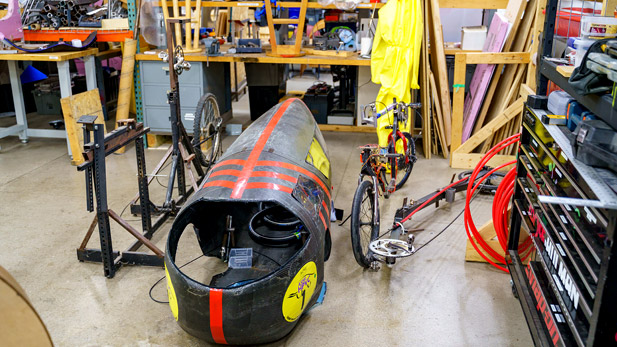Human-Powered Vehicle Team Turns a Corner

The Human-Powered Vehicle team's re-engineered “tadpole trike” features a single rear drive wheel and a significantly lower profile
Is it crazy to throw out what’s working well and just start over? Not to the Rose-Hulman Human-Powered Vehicle team. After taking first overall in American Society of Mechanical Engineers’ HPVC North America East competition in 2017, they turned heads as well as laps as the first American team to compete in the Pedal Prix at Loxton, Australia. There, the seventh generation of the iconic RHIT vehicle impressed observers with its ability to lean in corners like a motorcycle.
While competing in Australia last year, the Rose-Hulman team noted the lower-slung design of some other entries and decided to adapt it for their next vehicle. Years of the familiar one-wheel-in-front, two-in-back vehicles with the distinctive high-profile fairing gave way to a re-engineered “tadpole trike” with a single rear drive wheel and a significantly lower profile.
It’s the kind of challenge that fosters close connections among team members, says advisor Michael Moorhead, Ph.D., associate professor of mechanical engineering. “You get a group of students who become rather close as they go through four years together.” The Rose-Hulman team fared rather well in this year’s HPV East event at State College, Pennsylvania. Scoring 22nd overall out of 47 teams, they placed ninth in innovation and 13th in both men’s and women’s speed events.
With several members graduating, the HPV team itself is at a turning point. This fall, a new generation of student engineers will pitch in to design and build the next vehicle.
The new team, says Moorhead, will start work in earnest—and early. Years of tweaking the well-established “Rose Pedal” design had relaxed the urgency of the early design process. “They’ve got to start earlier in the year,” says Moorhead. “Because they hadn’t had to do anything dramatically different in previous years, they forgot how hard it is to start aggressively.”

